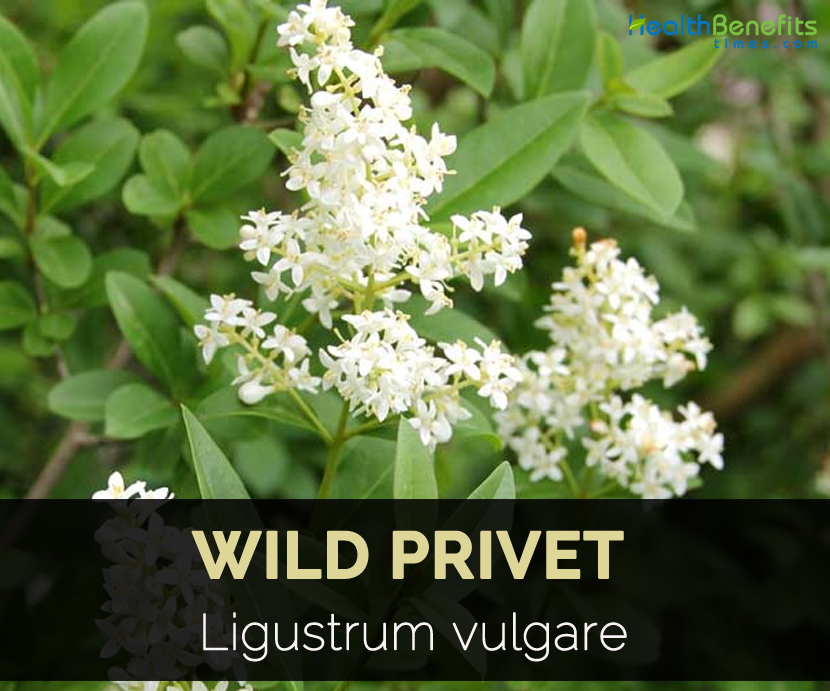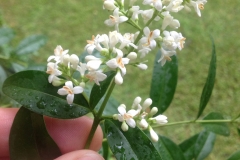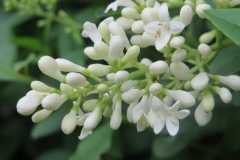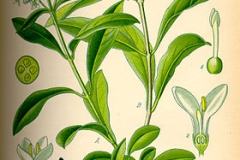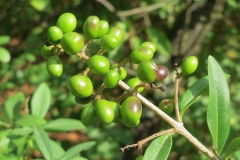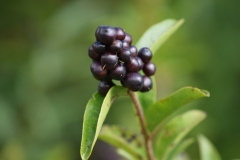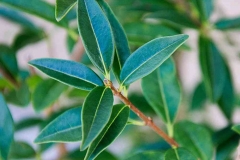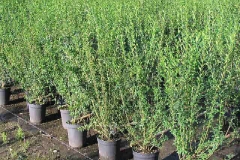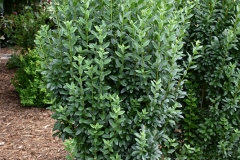Wild Privet is a fast growing and deciduous shrub which grows to the height of 10 to 15 inches tall and wide. It is winter hardiness and the most renowned species of Privet cultivated for hedging in northern areas. Today, it is the least ornamental of Privets and planted less frequently. It has been naturalized in various parts of U.S. and Southern Canada. Stems are erect, stiff with grey-brown dark spotted with small brown lenticels. Leaves are dark green, oval to lanceolate and about 2.5 inches long. Flowers are small, tubular and white which forms in panicles and about 3 inches long. Flowers bloom at the stem tips in June. Flowers are fragrant and possess strong and unpleasant aroma. Flowers give way to glossy and globe shaped drupes which ripen to black.
Facts About Wild Privet
| Wild Privet Quick Facts | |
|---|---|
| Name: | Wild Privet |
| Scientific Name: | Ligustrum vulgare |
| Origin | Europe, the temperate zone of East Asia and North Africa |
| Colors | Dark purple, almost black |
| Shapes | Spherical, 1 to 1.3 cm in diameter |
| Name | Wild Privet |
|---|---|
| Scientific Name | Ligustrum vulgare |
| Native | Europe, the temperate zone of East Asia and North Africa |
| Common/English Name | Privy, Prim |
| Name in Other Languages | Danish: Almindelig liguster, Liguster; English: European privet, Common privet, Privet, Privet-hedge, Wild privet; German: Gewöhnlicher Liguster, Liguster; Norwegian: Liguster; Afrikaans: gewone liguster; French: raisin de chien, troène vulgaire; German: Liguster; Italian: ligustro, olivella; Portuguese: alfena; Portuguese: alfenheiro, ligustro; Spanish: alheña, ligustro; Swedish: liguster; Transliterated Russian: birjučina |
| Plant Growth Habit | Semi-evergreen or deciduous shrub |
| Plant Size | 3 or 6 m height |
| Bark | Smooth, grey-brown |
| Stem | Stiff, erect, with grey-brown bark |
| Leaf | Lanceolate, oval or elliptical, 2.5-6 cm long, 0.5-1.5 cm wide |
| Medicinal parts | The leaves |
| Flowering Season | Mid-summer |
| Flower | 3–6 cm long, creamy-white |
| Fruit shape & size | Spherical, 1 to 1.3 cm in diameter |
| Fruit color | Dark purple, almost black |
| Fruit Taste | August to December |
| Seed | Oblong |
Distribution
Wild Privet is native to much of Europe, extending as far north as southwest Sweden and southeast Norway (USDA-ARS, 2015). It is also native to northwestern Africa (Morocco), and extends as far east as western Asia (Turkey, northwestern Iran, Armenia, Azerbaijan and Georgia)(Weeds of Australia, 2015). It is now also widely naturalized in south-eastern Australia, and naturalized in southern Africa, the Azores, New Zealand, the USA and southern Canada (Weeds of Australia, 2015). It is reported as invasive in North and South America (Canada, USA, Argentina and Brazil), South Africa, Australia and New Zealand.
Health Benefits of Wild Privet
1. Healthy heart
Wild Privet has diuretic and cardiotonic properties providing an energizing effect on heart and strengthens contractions of heart muscles. This causes the blood to pump more across the body and to its organs more efficiently.
2. Lowers the side effects of chemotherapy
Study shows that Wild Privet effectively reduces the side effects of chemotherapy in patients. It increases white blood cells to inhibit bone marrow loss due to radioactive therapies. It effectively induces sweating promoting patient’s immunity.
3. Prevent tumor growth
Medical studies as well as clinical trials are still needed to know that liquid extracts of Wild Privet prevents the tumor growth and helpful for treating Parkinson’s disease, hepatitis, AIDS and respiratory tract infections.
3. Eliminates salt and water
Liquid extract of Wild Privet promotes the elimination of salt and water from kidneys and also increases the volume of urine.
4. Relieves Pain
Besides providing relief from menopausal cramps, Wild Privet effectively cures backaches and rheumatic pains.
5. Relieve stress and dizziness
Raw and dried Wild Privet has cooling effect providing relief from heat associated to emotional stress and infection. It is helpful for individuals with blurred vision, emotional stress and dizziness.
6. Other benefits
Wild Privet is helpful for treating arthritis, common cold, insomnia, stomach problems, constipation and congestion. It provides relief from painful joints due to rheumatism, promotes hair growth, lowers heart palpitations, delays premature aging, lessens facial dark spots and also prolonged lifespan.
Uses
A decoction of the leaves is valuable in chronic bowel complaints, ulcerations of the stomach and bowels, or as a gargle for ulcers of mouth and throat and where there is bleeding of either bowel or mouth. Useful in diarrhoea and summer complaints of children; as a decoction for offensive ulcerated ears with offensive discharges and excessive flow of urine. A solution as a vaginal douche is toning to the tissue and will expel offensive discharge. Of the decoction, 1 teaspoonful to 1 cupful of boiling water, ½ cupful three times a day. Of the powder, 15–20 grains.
Medicinal uses
- Wild Privet helps to improve vision and darken hair.
- It is also used in the detox benzene poisoning.
- Leaves or bark decoction is used for treating chronic bowel problems, stomach ulcers, diarrhea, sore mouths, throats, chapped leaves and skin problems.
- When used in form of tea improves appetite and digestion in chemotherapy patients.
Precautions
- Avoid by pregnant and breastfeeding mothers especially privet tea.
- Child under the age of 12 also should not drink privet tea.
- It can aggravate asthma symptoms and those who have experienced this health condition.
- People suffering from diarrhea should also avoid its consumption.
- If you suffer from diarrhea, you should also avoid consuming privet fruit.
- Limit the tea intake to 5-6 cups per day.
- Excessive intake could result in symptoms such as headaches, vomiting, loss of appetite, dizziness and insomnia.
References:
https://npgsweb.ars-grin.gov/gringlobal/taxonomydetail.aspx?id=22101
https://pfaf.org/user/plant.aspx?latinname=Ligustrum+vulgare
https://www.cabi.org/isc/datasheet/30764
https://www.naturalmedicinefacts.info/plant/ligustrum-vulgare.html
https://www.befantastico.com/the-wonderful-health-benefits-of-privet-fruit/
https://en.wikipedia.org/wiki/Privet
https://en.wikipedia.org/wiki/Ligustrum_vulgare
https://latestaccounting.com/health/benefits-of-privet-tea/


